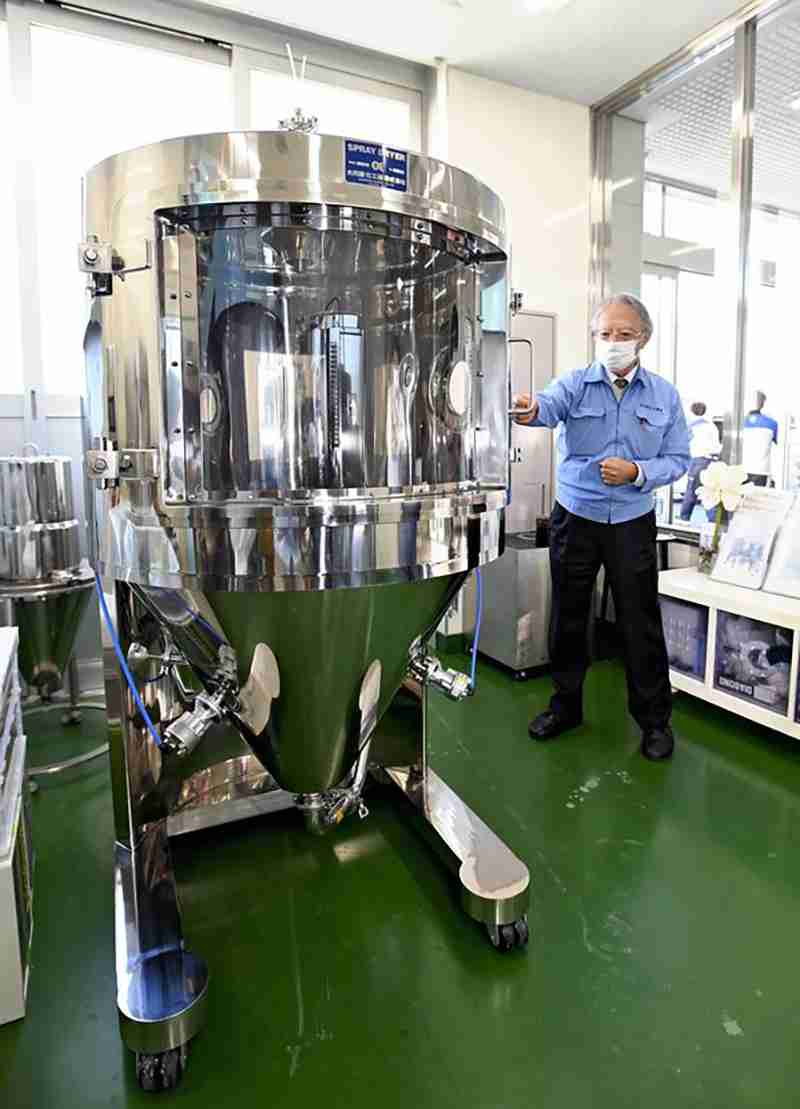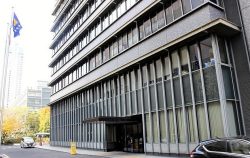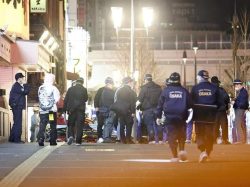
Masaaki Ohkawara, president of Ohkawara Kakohki Co., explains about a spray dryer.
11:36 JST, December 27, 2021
A company president, who had been indicted along with two others for allegedly exporting machines that could be used for production of biological weapons, was effectively acquitted after the indictment against them was withdrawn.
The company consistently insisted its innocence, conducting numerous experiments to prove that its machines were not subject to export restrictions. Amid all this, the prosecutors suddenly canceled the indictment against them, and on Dec. 7, the Tokyo District Court ordered that compensation be paid for the president’s 332-day detention.
“The investigation must be reexamined,” Masaaki Ohkawa said.
‘There were no problems’
“I was relieved,” said the president of Ohkawara Kakohki Co., a Yokohama-based manufacturer of precision machinery. The district court ordered on Dec. 7 a total of ¥11.3 million to be paid in compensation for the arrest and detention of the three former suspects. “The misunderstanding can now be cleared up.”
Ohkawara, 72, and two others were arrested and indicted on suspicion of exporting restricted machines without authorization in 2020. The machines at issue were dryers that spray liquid inside and heat it to make powders. Spray dryers are used for a wide range of applications, including producing soluble coffee powders and infant formula.
The company has developed spray dryers since the 1980s and exported them mainly to Asian countries.
Ohkawara Kakohki was first investigated by the Metropolitan Police Department in October 2018. For about 18 months, about 50 individuals, including company employees, were questioned 264 times on a voluntary basis.
Ohkawara and the two others were arrested and indicted between March and June 2020 on suspicion of “exporting a precision machine that can be used for production of biological weapons.” Ohkawara cooperated fully with investigators during the voluntary questioning, but after his arrest, he remained silent until he was released on bail in February.
“There shouldn’t have been any problem,” Ohkawara recalled. “I felt helpless.”
Vague criteria
Spray dryers that have an internal sterilization function became the subject of export restrictions under a 2013 ordinance of the Economy, Trade and Industry Ministry. The reasoning was that if a powder containing toxic bacteria was created in the machine and the remaining bacteria then sterilized, a spray dryer could be used repeatedly for such purposes as bioterrorism, because terrorists could create the toxic powder without fear of infecting themselves.
However, there is no clear definition of “sterilization” in the ordinance and no criteria for the amount of bacteria to be reduced or how. Ohkawara Kakohki therefore concluded that the machines in question were not subject to export restrictions.
The investigators experimented with the same type of machine and concluded that the company’s product could kill E. coli bacteria if the inside was kept at 90 C or higher temperature for two hours. Prosecutors used this conclusion as their basis for seeking a guilty ruling.
4 days before hearing
After the arrest of the president and two others, the company carried out 72 experiments with its machines. It found that some E. coli bacteria survived after air heated to 240 C was blown inside the machine for nine hours. The company argued that its spray dryers have no sterilizing capability and criticized that investigators’ experiments were sloppy.
On July 30, four days before the first hearing of the trial against the three, the Tokyo Public Prosecutors Office suddenly dropped the indictments, saying that the possibility could not be ruled out that the machines were not subject to export restrictions.
“We were conducting additional experiments, but it would take some time to get the results,” a senior public prosecutor said. “We decided to withdraw [the indictment] because there was still a possibility for a not-guilty ruling.”
Ohkawara Kakohki has filed for compensation from the central and Tokyo metropolitan governments.
“We’ve been working honestly ,so why did we have to be involved in such a situation?” Ohkawara said. “The investigation must be examined, also to prevent something like this from happening again.”
Top Articles in Society
-

Man Infected with Measles Reportedly Dined at Restaurant in Tokyo Station
-

Man Infected with Measles May Have Come in Contact with Many People in Tokyo, Went to Store, Restaurant Around When Symptoms Emerged
-

Woman with Measles Visited Hospital in Tokyo Multiple Times Before Being Diagnosed with Disease
-

Australian Woman Dies After Mishap on Ski Lift in Nagano Prefecture
-

Foreign Snowboarder in Serious Condition After Hanging in Midair from Chairlift in Nagano Prefecture
JN ACCESS RANKING
-

Japan PM Takaichi’s Cabinet Resigns en Masse
-

Japan Institute to Use Domestic Commercial Optical Lattice Clock to Set Japan Standard Time
-

Israeli Ambassador to Japan Speaks about Japan’s Role in the Reconstruction of Gaza
-

Man Infected with Measles Reportedly Dined at Restaurant in Tokyo Station
-

Videos Plagiarized, Reposted with False Subtitles Claiming ‘Ryukyu Belongs to China’; Anti-China False Information Also Posted in Japan
























